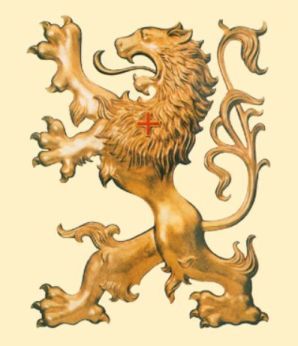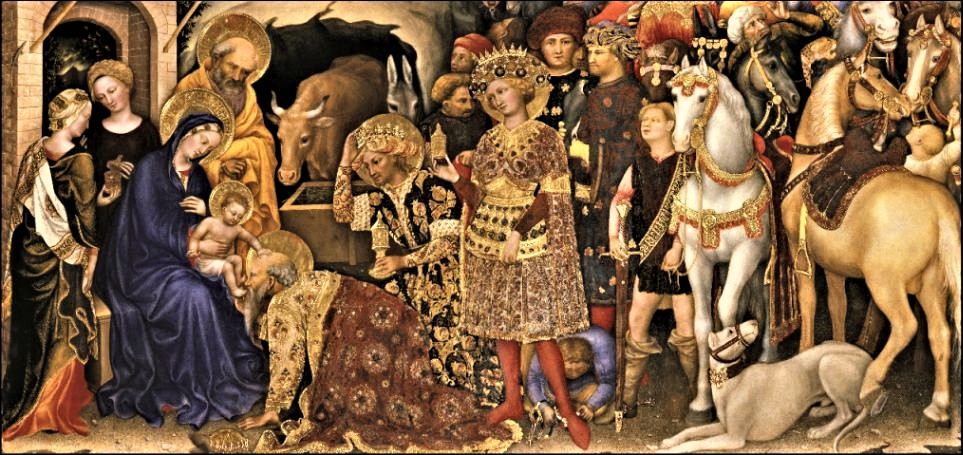|
Plinio Corrêa de Oliveira
Light, the ultimate gift
TFP Viewpoint, December 2014 (*) |
|
|
And there were in the same country shepherds watching, and keeping the night watches over their flock. And behold an angel of the Lord stood by them, and the brightness of God shone round about them; and they feared with a great fear. And the angel said to them: Fear not; for, behold, I bring you good tidings of great joy, that shall be to all the people: For, this day, is born to you a Saviour, who is Christ the Lord, in the city of David. (Luke 2:8–11) The night was well advanced. The darkness had reached its maximum density. The flocks of sheep were surrounded by the unknown and danger. Possibly some shepherds, too easy going or overcome by fatigue, were sleeping. There were, however, some who retained their sense of zeal and duty, and so did not succumb to slumber. They watched, and presumably they also prayed so that God would protect them from the surrounding dangers. Suddenly a light appeared and enveloped them: “the brightness of God shone round about them”. All sensation of risk melted away. Much more than the problems and risks of a few poor flocks or a handful of shepherds melted away. Much more than all the constant dangers to earthly interests melted away. What was announced to them was the solution to the problems and risks that affected mankind in that which is most noble and precious: the soul. The goods of this earth sooner or later perish, but eternal life is forever, whether for happiness or desolation. Without being as pretentious as to attempt to interpret the Sacred Text, I cannot but help being struck by how similar our world is today to that of the shepherds and flocks of sheep on that first Christmas night. Many historical sources from those faraway days tell us that many people then felt that the world had irremediably failed, that the complexity of the problems had made any solution impossible, and that chaos and destruction were on the horizon. The people of those days could look back on the years gone by and be understandably proud. They had reached an apex of culture, of wealth, and of power—the Roman super state in particular. Long gone were the days of Year 1 when barbarian tribes roamed vast stretches of the Earth fighting against all sorts of adversity. Gradually, however, nations appeared; each with their own characteristics, culture, intelligence, and practical institutions. They made roads, began navigation, and spread far and wide both the fruit of the earth as well as industry. Of course there were abuses and disorders, but mankind did not view them as such so clearly, because every generation suffers from a surprising insensitivity towards the evils of its own day. The crux of the situation of the Old World was not in that they did not have what they wanted. It was that generally speaking, after having painstakingly acquired the means to be happy, they did not know how to make use of them. For years they had laboured to acquire these things, but their souls felt a terrible emptiness. Sometimes it even tormented them, because when power and wealth are not properly used, they become cumbersome and bring affliction. Consequently, darkness enveloped man. What did he do? He did what everyone does when night comes. Some flung themselves into orgies, others slept deeply, while yet others—and how few they were—did as the shepherds did. They kept vigil. They watched out for the enemy jumping out of the darkness to assault and to whom they gave immediate combat, or they gazed up at the dark heavens with the certainty that one day the sun would dawn to persecute the darkness, and to eliminate one’s enemies or make them retreat to their dens who had been protected by the darkness and thus emboldened to commit crimes. In the Ancient World, amongst the millions of people crushed by useless culture and opulence, there were those special people who perceived how dense was the darkness, how corrupt were the customs, how the apparent order lacked authenticity, how much risk mankind was running, and moreover, how a civilisation based on idolatry had led to a state of nonsense. These special souls were not necessarily well-educated or highly intelligent, for the lucidity to see the great horizons, the great crises, and the great solutions comes not so much from intelligent insight, but rather from uprightness of the soul. The latter understood the situation because for them truth was truth, error was error. Good was good and evil was evil. These are souls who are not complicit with the excesses of the day, cowered by scorn or by the isolation the world imposes on those who do not conform. These souls were of high quality, rare, and spread few and far between amongst masters and servants, seniors and children, wise and the unlettered. They all kept watch, prayed, fought, and hoped in the darkness. This hope first came to the faithful shepherds, but, as the Gospel relates, it then went beyond the farthest reaches of Israel and shown a great light to all those around the world who refused the option to sink into orgies or into a stupid and lazy slumber. When virgins, children and seniors, centurions, senators and philosophers, slaves, widows and potentates began to convert, it was then that the waves of persecution were unleashed against them. Nothing, no matter how violent, could break them, and when, in the arena, they gazed proudly at the Caesars, the onlookers, and the beasts, the Angels in Heaven sang: Glory to God in the highest and peace on earth to men of goodwill. This canticle of the Gospel was not heard by any human ear; but rather it moved the souls. The blood of these serene and unbreakable heroes was thus transformed into the seed of new Christians. The old world that adored the flesh, gold, and the idols died, and a new world was born based on the Faith, on purity, on self-denial and the hope of Heaven. Our Lord Jesus Christ had solved it all. * * * Are there today still authentic men of goodwill who keep watch during the darkness, who fight in anonymity, who gaze to Heaven hoping with unbreakable certainty that the light will return? Yes there are, just like at the time of the shepherds. Those like the TFP can be found everywhere: in the streets, squares, planes, skyscrapers, basements, and even in places of luxury—still with faint glimmers of tradition—where the false elites largely dominate. They openly smile at those who proclaim an ideal that never dies because it is based on Jesus Christ. We see they hope for some intervention of God in History to purify mankind and that will end this cycle of darkness and open a new one full of light. To these authentic men of goodwill, to these authentic descendants of the shepherds of Bethlehem, I suggest they see the words of the Angel as directed to them: “Fear not; for, behold, I bring you good tidings of great joy that shall be to all the people.” These are prophetic words echoed in Our Lady’s promise at Fatima. Communism may spread its errors throughout the world. It may make the just ones suffer. But, finally—Our Lady foretold at Fatima—Her “Immaculate Hear will Triumph”. This is the great light that, as a precious Christmas gift, I wish for all my readers and, most particularly, to those authentic men of goodwill. (*) This article was published in the Folha de São Paulo on the 26th December 1971. For many years Prof. Corrêa de Oliveira was a weekly contributor to this daily broadsheet, one of the most influential in Brazil. TFP Viewpoint is published by the Tradition, Family, Property Bureau for the U.K. editor @ tfpuk.org.uk |
|


